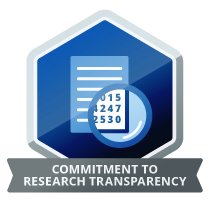Commitment to research transparency and open science

We embrace the values of openness and transparency in science. We believe that such research practices increase the informational value and impact of our research, as the data can be reanalyzed and synthesized in future studies. Furthermore, they increase the credibility of the results, as independent verification of the findings is possible.
Of course, this has multiple consequences for all parts of my work:
- For my own empirical research that includes 1. Open Data, 2. provide reproducible scripts, and 3. to adhere to the 21 word solution (Simmons, Nelson, & Simonsohn, 2011, 2012) to prevent false-positive psychology: „We report how we determined our sample size, all data exclusions (if any), all manipulations, and all measures in the study“. 4. I try to convince the first author(s) of any co-authored publication to act accordingly.
- For me as a reviewer, I will ask the authors to add a statement to the paper confirming whether, for all experiments, they have reported all measures, conditions, data exclusions, and how they determined their sample sizes, which is also known as the Standard Reviewer Statement for Disclosure of Sample, Conditions, Measures, and Exclusions. I’m really interested how this will turn out.
- Commitments for the supervision of dissertations are substantial: 1. I will teach and emphasize „methods that enhance the informational value and the replicability of studies“, 2. Open Data, Open Materials, and reproducible scripts given to me as supervisor, 3. potential publications are expected to follow the commitments mentioned above, 4. in case of experimental research in a confirmatory manner, at least one pre-registered study has to be conducted „with a justifiable a priori power analysis (in the frequentist case), or a strong evidence threshold (e.g., if a sequential Bayes factor design is implemented)“, 5. grading is independent of successful publication or statistical significance.
- Finally, as member of any committee or editorial board, I will promote the values of open science.
tl;dr
I embrace the current methodological revolution in psychology/science and signed the Commitment to Research Transparency and Open Science.
References
- Simmons, J. P., Nelson, L. D., & Simonsohn, U. (2011). False-positive psychology: Undisclosed flexibility in data collection and analysis allows presenting anything as significant. Psychological Science, 22, 1359–1366. doi:10.1177/0956797611417632
- Simmons, J. P., Nelson, L. D., & Simonsohn, U. (2012). A 21 word solution. Retrieved from http://ssrn.com/abstract=2160588 or http://dx.doi.org/10.2139/ssrn.2160588
- The „Commitment to Research Transparency“ logo is licensed by Tobias Kächele, Lena Schiestel and Felix Schönbrodt under a Creative Commons Attribution 4.0 International License.